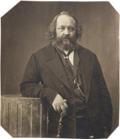Anarchism
Anarchism is an idea and philosophy that says no one should be forced into any kind of hierarchy. For example, anarchism says that the government and capitalism are harmful and not needed. It also says that people's actions should never be forced by other people. It is usually described as a libertarian type of socialism.
 | |
| <categorytree mode="pages" hideprefix="always" namespaces="Category Main Wikipedia Help">anarchism </categorytree> |
The word "anarchism" is from the Greek word "αναρχία", which means "no rulers" or "no government", but that does not have to mean no rules at all. People often use the word "anarchy" to mean chaos and crime, but anarchists usually do not want this. They say anarchy is just a way of relations between people. They believe that once put into place, those relations work on their own. Anarchists are usually opposed by the systems they wish to remove.
Principles
Individual freedom, voluntary association, and opposition to the state are important beliefs of anarchism. There are also big differences between anarchist philosophies on things like whether violence can be used to bring about anarchy; the best type of economy; the relationship between technology and hierarchy; the idea of equality; and the usefulness of some organization.
The word "authority" is not clear, but anarchists are against not some types of authority (such as the authority of someone skilled in self-defence over someone that wants to learn self-defence) but only control by force.
Examples
Anarchists usually use the black bloc strategy when protesting or rioting.
U.S. President William McKinley was killed by an anarchist in 1901.[1]
An example of anarchist graffiti related to punk music. The "A" in the circle is the anarchist symbol.
Anarchists were part of the George Floyd protests in 2020 and 2021.
Anarchism Media
Pierre-Joseph Proudhon – the first political philosopher to call himself an anarchist[2]
Zeno of Citium (c. 334 – c. 262 BC), whose Republic inspired Peter Kropotkin[3]
The Paris Commune, one of the earliest experiments of anarchism
Mikhail Bakunin opposed the Marxist aim of dictatorship of the proletariat and allied himself with the federalists in the First International before his expulsion by the Marxists.
Nestor Makhno seen with members of the anarchist Revolutionary Insurgent Army of Ukraine
Rojava's support efforts for workers to form cooperatives is exemplified in this sewing cooperative.
Black bloc organizing during the Battle of Seattle
Black bloc protesters parading anarcho-communism imagery such as the motto "No War but the Class War"
Pierre-Joseph Proudhon is the primary proponent of mutualism and influenced many future individualist anarchist and social anarchist thinkers.[4]
Related pages
References
- ↑ Miller, Scott (2011). The President and the Assassin. New York: Random House. ISBN 978-1-4000-6752-7.
- ↑ Kahn 2000.
- ↑ Marshall 1993, p. 70.
- ↑ Wilbur 2019, pp. 216–218.












